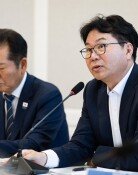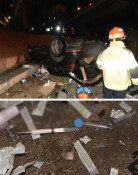When power lines citizens up
When power lines citizens up
Posted June. 29, 2019 07:55,
Updated June. 29, 2019 07:55
The weather in Orlando last Tuesday (local time) was just like President Trump, who was due to his visit to the region for his campaign kickoff rally; unpredictable. Heavy rainfall hit the area, but it was soon followed by sweltering heat, with the temperature going over 30 degrees Celsius and humidity exceeding 70 percent. Within minutes out there, the sweat was running down on the back.
The campaign organizer seemed determined to attract as many supporters as possible for the event. They said tickets to the venue, a 20,000-capacity stadium, are to be issued without restrictions and people will take seats on a first-come, first-serve basis. Trump had also actively promoted the event, tweeting that there were “over 100,000 requests” to join the rally. All these efforts apparently led to the long lines of supporters, who started to queue up even 40 hours before the gathering.
In fact, lining people up is a common strategy for businesses to stress that they are good restaurants or luxury brands. Consumers, although they know that this is part of the businesses’ tactics, find it hard to say no. Such a marketing gimmick has now become prevalent even in elections, the symbol of democracy.
On that day, a shade for supporters who had to wait under the scorching sun was nowhere to be seen near the venue. While standing in line from 12:00 p.m. to 5:00 p.m., this reporter saw four people collapsing. One woman, with her face having turned white, was taken in a wheelchair, and others were carried on a stretcher. Paramedics who had to push their way through the crowd also had difficulties in transferring patients. Still, those lined up did not say a word of complaint. It was just amazing to see how these people were politically passionate and patient.
In another event in Washington D.C. the next day, Trump said that “literally tens of thousands of people couldn’t get in (the rally),” but local media outlet Orlando Sentinel reported that “about an hour before the president’s speech, the long lines around the Amway were gone and people could easily walk into the event right up to the start of the rally.” The Late Show with Stephen Colbert on CBS also said that the area was quiet outside the hall. This indicates most people did not need to wait in line to enter the arena.
Edward Bernays, one of the most renowned public relations consultants in the 20th century, said that a public speech used to be a powerful means to affect public sentiments, but came to have a different value in the modern society. The importance of a speech, from the perspective of promotion, lies in its impact, he said. According to Bernays’ reasoning, how a speech is described through media has more ramifications than a speech itself. It seems President Trump and his campaign must have known this theory more than anyone else.
There is a clear reason that Trump’s supporters look up to him as if he is a famous rock star. Trump’s campaign, which has continuously blasted the existing political circles resembles, in a way, a rock star’s spirit of resisting the mainstream culture. During his speech in Orlando, Trump called the last presidential election “our chance to reclaim our government from a permanent political class that enriched itself at your expense.” Yet, a marketing strategy employed by his campaign for the event, which seemed to be taking “supporters’ expense” for granted, leaves one wonder about his sincerity.
In interviews with this reporter, supporters who had attended the rally expressed their concern about “the president being surrounded by Congress and media” in unison. Would it be baseless anxiety to worry about the scene where citizens don’t get mad at having to line up in the sizzling weather for an authority but only care about an authority’s future?
Yong Park parky@donga.com







